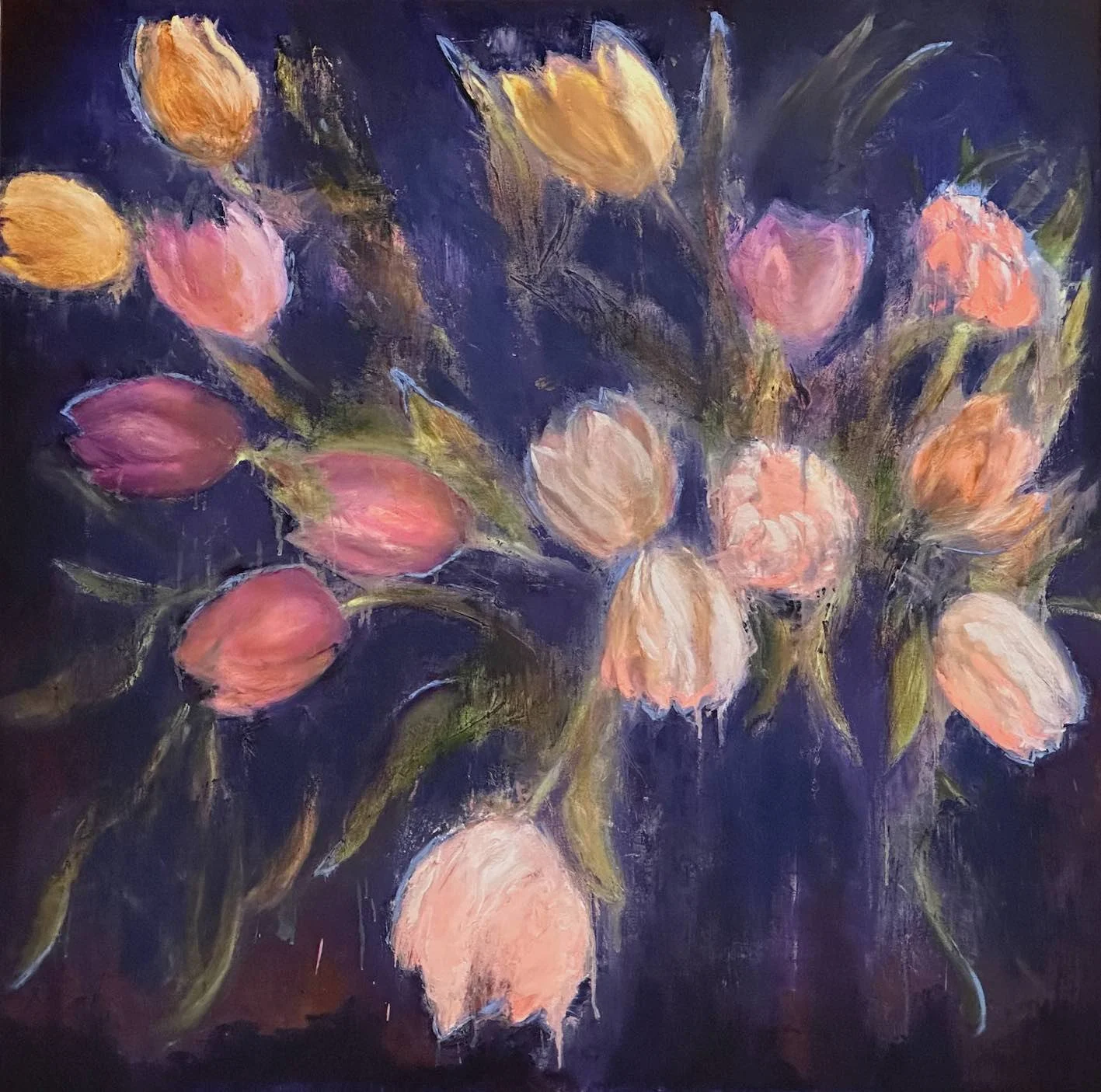‘Its Only Bees’
Ann-Marie Brown is a Canadian artist known for her encaustic paintings that explore emotional and psychological depth through ambiguity, texture, and intuitive process. Her work has been exhibited across Canada and the U.S., with recent shows at Soul Gallery (Winnipeg) and the Women’s Art Museum of Canada (Edmonton). She currently lives and paints on the edge of the Salish Sea.
Its Only Bees
Carpenter bees glinted in the sunlight as they darted around the holly bushes. Heavy bunches of small yellow flowers bowed slender branches toward the ground. The Vales’ wooden fence was riddled with holes, and the front and back porches fared no better—every beam and railing splintered around the entrances to hidden bee caverns. They chewed through the white paint, tunneling into the wood and weaving their network. They were building something together. Each bee was preparing a nest for her young in the born tunnels. Each worked alone, but their movements entertained a collection of effects. First, the air did not buzz, it resonated, carrying lingering carpenter bee energy in stagnant clouds that were occasionally cut up by gusts of spring wind. Second, flight paths and wooden tunnels linked amorphously into a blueprint of pipes that crossed over one another, transporting materials to and from the holly bushes. The fence and the porch were transformed into a natural history, a multigenerational harbor with a map and a timeline. Thermo spruce decking, white latex paint— it was all turning into bees.
Out front, a sparse bed of pansies struggled; out back, a chipped stone birdbath tilted precariously. Inside, a cluster of lilies sat atop the kitchen table, arranged like a little monument. They were the season’s first.
Lena sat with her mother as they slipped off their modest shoes. Even indoors, they could hear the oscillating hum of bees and the occasional tap-thud as one collided with a window. The house darkened as natural light twisted into the gathering clouds outside while her mother moved to the sink and attacked a towering teeter totter of dishes with sharp, angry clatters. The cheap ceramic wobbled, threatening to topple in the basin.
“Would you like some help?” Lena asked.
“No,” her mother replied. Her head hung low in the sink. “Just take your shoes upstairs.”
Lena hadn’t even begun untying the few laces on her ballet flats. She was sitting there still, motionless. Her gray flats dangled in her mind, her gaze fixed on the lilies, her eyes scrutinizing. “Do you think Dani will get to keep the kid?” Lena asked suddenly. “The one they were fostering. Will they let her, if she wants to? Even by herself?”
“No, I don’t think so.” Her mother’s voice was clipped. “And please take the lilies outside.” They usually didn’t fight for the first few days. Her mother made it so miserable when they did, that afterwards they often didn’t speak for months. Unfortunately, Lena was home a few months early.
“It’s too cold out. They’ll die.” she replied, noticing the thickening shade. But a warm breeze was picking up, whirling around the holly bushes, whistling as it gathered force. Lena could feel the energy in the air, a vortex building.
Her mother scrubbed harder. “Well, take them somewhere. They smell.”
Before the funeral, her mother had said something to her about her makeup, and not wanting to fight, Lena wiped it off without protest. She also swapped her high black heels for her plain gray flats, a small gesture that she had packed for just in case. Now, she frustratedly questioned whether her perfume had been too much for her mother as well. It was the same perfume she wore to dates and parties. She was usually complimented on it. Floral, soft—like Easter lilies. Easter meant resurrection. And death. And painted eggs.
You’re not supposed to feel angry about death at Easter.
“I like them there,” she replied. “I think they will be nice for the party.”
Her mother stiffened at the word.
It was fine. Lena understood. Quietly, she collected the lilies in a shallow hug. Things had been cold since she came home. They had both finally given up. She took the lilies to the back porch where the wind snapped through her hair and the carpenter bees’ buzz added to the texture collecting in the sky. The clouds would soon split open to either rain or a wonderful blue. Lena smiled and listened to the buzz mounting in intensity. Her mother did not even glance at her through the kitchen window. The Carpenter bees buzzing resulted in a reverberating crack. The deck collapsed beneath her. She did not disappear. She flashed—then fell — and dust from the deck settled over her head.
Sully Proctor is a writer from North Carolina. He enjoys long walks on the beach. When not enjoying long walks on the beach, he advocates for the dismantlement of suburban lawns.
